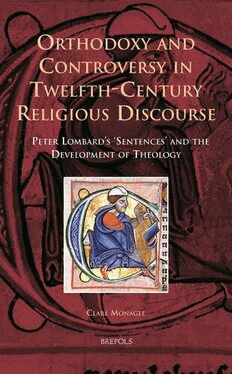
Orthodoxy and Controversy in Twelfth-Century Religious Discourse: Peter Lombards 'Sentences' and the Development of Theology (EUROPA SACRA) PDF
214 Pages·1.306 MB·English
Most books are stored in the elastic cloud where traffic is expensive. For this reason, we have a limit on daily download.
Preview Orthodoxy and Controversy in Twelfth-Century Religious Discourse: Peter Lombards 'Sentences' and the Development of Theology (EUROPA SACRA)
Description:
Analysing the contested reception of Peter Lombard's masterful Book of Sentences after 1160, the author argues that this period was a time of hitherto unrecognised intellectual conflict and negotiation that was based in arguments about the constitution of Christ's hypostasis. Peter Lombard was accused of having derogated Christ's humanity to the point of saying that "in as much as he is a man he is not something." This accusation, in turn, led to broader discussions about the validity of scholastic reasoning when applied to divine mystery. This conflict was finally resolved in the Constitutions of Lateran IV, when Peter Lombard's Book of Sentences was endorsed as orthodox. Tellingly, this endorsement came alongside the emphatic assertion of papal primacy that occurred at that same council. In Christological Nihilism in the Twelfth Century the author examines the logical relationship between the endorsement of the Lombard and the statement of primacy that takes place at Lateran IV, casting new light on the relationship between the development of scholastic methodology and the refinement of papal authority that occurs over this period.
See more
The list of books you might like
Most books are stored in the elastic cloud where traffic is expensive. For this reason, we have a limit on daily download.
